Autostraddle’s community members are all one in a million special snowflakes, and the only thing even better than @-replying their avatars is meeting them face-to-face. Claire and Whitney, rockstar Autostraddle meet-up group captains, know this for a fact. That’s why they’re going to spend the next few months hosting conversations with lots of different folks who are parts of ‘straddler communities IRL in this very series! These posts are organized and put together by Claire and Whitney, although I am proud to present them! Come on in, join the conversation, and take away some inspiration for meet-ups of your own! Together, we’ll build the ‘straddler nation.
For their second installment, Claire and Whitney talked to a some leaders of their local meet-up groups, focusing this conversation on how we can try to create inclusive, safe spaces for people both in our online spaces and IRL.
Meet the Crew
Claire (@claire7)
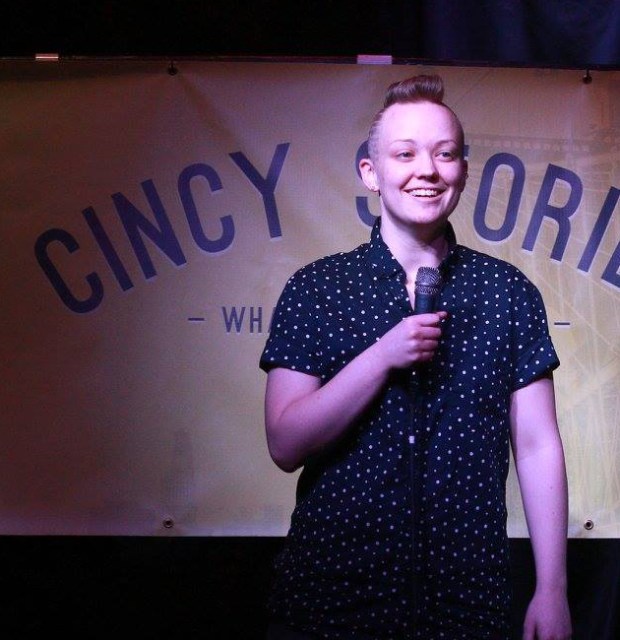
My name is Claire – she/her or they/them pronouns. I live in Cincinnati, where I co-founded our Straddler group about two years ago, and still do a lot of meetup-planning and general organizing of the group. I’ve also been to A-camp three times and could talk about it for hours on end. Here in Cincinnati, I work at a publishing company and do lots of creative endeavors: painting, poetry, writing a hella queer novel, etc.
Whitney (@whitney-lauren)
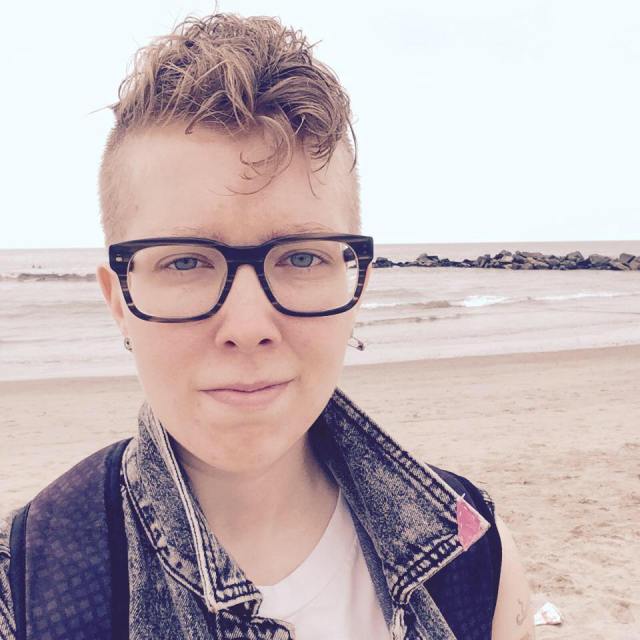
I work for a company that makes and sells sport containment systems. So basically hockey, soccer, lacrosse etc. walls. I wear a lot of hats as it’s a family owned company with 3 employees and an office dog but I dig it. When I’m not there, I spend time organizing within the Twin Cities Autostraddlers. I created the Facebook group back in the summer of 2013 to make some rad friends and it has grown to over 1,000 members! I also created and put on a quarterly event called Queer Cuts for a Cause. Fun stuff!
Cameron (@glavinder)
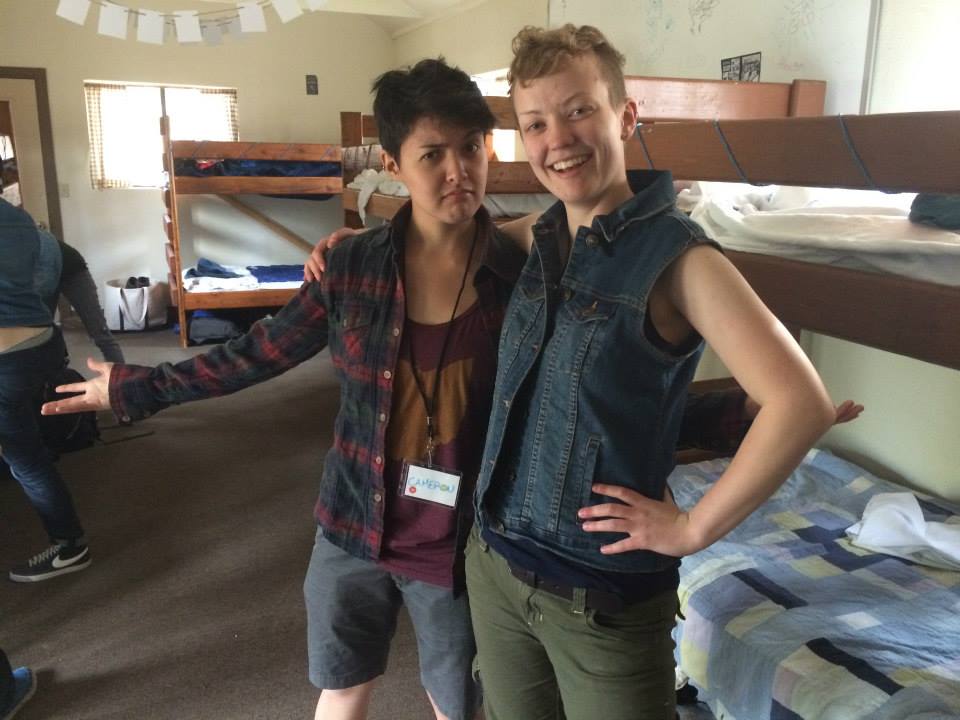
I’m Cameron, I use she/her or they/them pronouns. I do a monthly comic for AS. I’m from/live in Cleveland, Ohio and co-founded the our Autostraddle group just last winter in time for the Holiday parties. I do most of the general organizing and social outreach. I’ve been to A-Camp as a camper twice and (after this upcoming camp) will have been staff there twice also. Truly blessed, man. What a utopia. Here in Cleveland I do some freelance illustration/design and work in a restaurant to feed my expensive art habit. When I’m not doing that I’m probably watching tv shows that are more likely queer baiting me than not OR confusing the NSA with my search history as I do research for a collab comic.
Brandalynn (@bird)
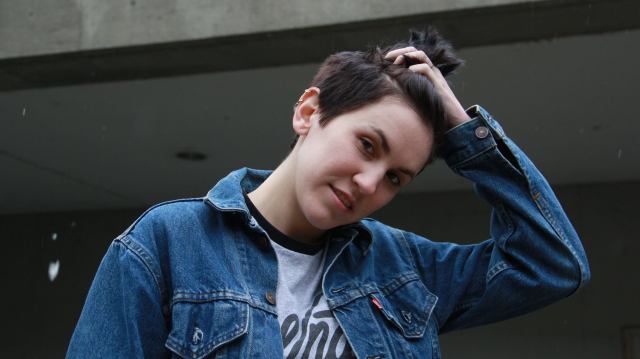
I’m Brandalynn, she/her or they/them pronouns. I founded the straddler group in Indianapolis in summer 2014 and try to turn a variety of suggestions for activities/meet-ups into reality. Aside from my 9-5 in international higher ed, I am an active member of a local grassroots organization called Indy Feminists which, considering all the nonsense put forth by the Indiana legislature and governor, keeps me rather busy. I have possibly too many part-time hobbies and I think my newest one may be gardening/plants… we’ll see if I stick with it.
The Whole Shebang
Claire: The first question we have is simply: What does “safe safe” mean to you and your group?
Brandalynn: Oh, coming out the gate with the tough questions!
Claire: Yeah, we’re trying to trip you up. JK, there’s no right answer!
Whitney: For me, inclusive and welcoming to all are huge parts of it. Wherever people are at in their journey is totally legit and is welcome in the group as long as they are respectful of others the same way.
Brandalynn: Safe space for me would be somewhere everyone is free to be themselves and to grow as they need to coming from wherever they are. The respectful and inclusivity pieces are very important too, as Whitney mentioned.
Claire: Very cool. I totally agree. I also think for me, I like to distinguish that “safe space” does not equal “comfortable space.” Being around others who are different from you might make you a little uncomfortable, but the important thing is that everyone feels safe and everyone gets some tools in their toolboxes to talk about differences in a meaningful and respectful and considerate and supportive way.
Cameron: Oh, man. My group is super new, so right off the bat we’re trying to create an open forum for discussion and engagement. We don’t have a whole lot going on yet, but we’re trying to right off the bat push inclusivity. This is the first time I’ve managed any kind of social group, so I’m really grateful for this question and hearing your answers.
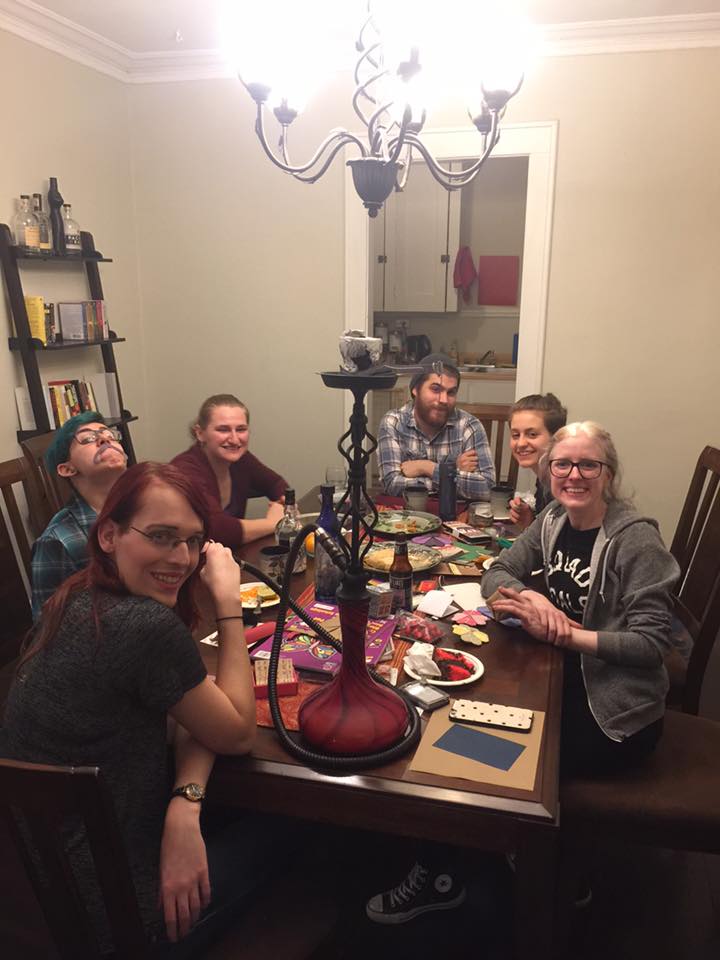
Cleveland ‘straddlers breaking bread.
Claire: Aw, yeah! Awesome, Cameron! That’s part of why we’re doing these interviews, to start these conversations. And the concept of safe space is something I think we’re all still learning a lot about every day. There’s always room to improve!
Whitney: Totally legit Cameron! It took a bit for me to get to a point where I thought about safer spaces for the Twin Cities Autostraddlers group and put it into action. It definitely takes time!
Cameron: I think being open to the idea that “safe space” means something different to everyone is super important too? Like just being aware that you’re not always going to anticipate someone’s needs, so to take criticism openly instead of accidentally further marginalizing someone by getting defensive.
Claire: Oh, word, I love that. Particularly when we experience different intersections of oppression. I experience different things as a white genderqueer person than maybe a black femme cis woman would, and it’s good to just put on our Listening Caps as much as humanly possible.
Brandalynn: Love that, Cameron. Does anyone operate with a formalized safe space agreement for their group? It’s something i’ve been debating trying to put in place for a while but I’m not sure if it’s an established “thing” in the Straddleverse.
Claire: Ah, excellent question. We were going to be getting to that, but let’s talk about it now! Cincy Straddlers, my group, drew up some documents for creating safe space specifically on our facebook group page, but that was about a year and a half ago. Now that we’ve tripled in size, we’re looking at revising that and making it easier to find on our page and understand in a quick minute. We’re hoping that, for example, small things like someone addressing the whole group as “ladies” doesn’t happen as much, hopefully — I know that is a totally understandable mistake, but it can make trans men and nonbinary folks who are on the page feel uncomfortable. We’re hoping to address small stuff like that. But also larger stuff, like when someone says something problematic and how we “call in” so that no one gets defensive but we do start productive conversations. So, Cincy Straddlers is in the middle of figuring out how to revise some basic guidelines for our safe space efforts – for both our online interactions and our in-person interactions. That’s why it’s so great that I’m getting to have this conversation with you all now, and pick your brains on creating safe space!
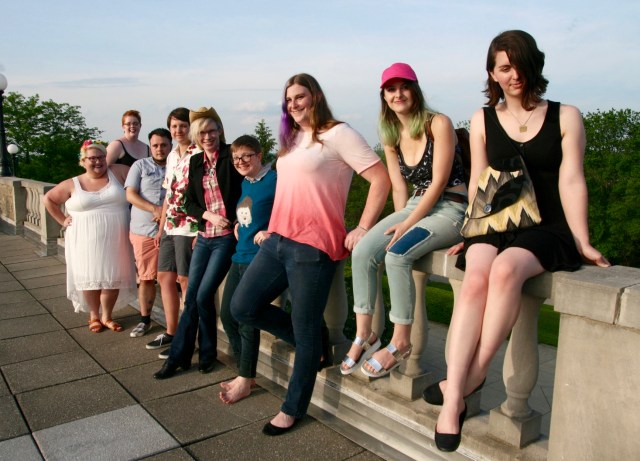
Cincy ‘straddlers photoshoot!
Whitney: The Twin Cities Autostraddlers group doesn’t have a formal document although I’m thinking more and more that it should as we’ve run into some issues. I’ve tried to lead by example and give praise and encourage others to be positive examples of intentional listening and addressing issues directly via face-to-face conversations and private messages or texts instead of blasting someone publicly or talking behind backs. When we ran our TC Camp event last summer, there were documents in place for that event that I could see being tweaked to use for the group as a whole.
Cameron: I’m kind of trying to learn from the shortcomings of another community page I’m still — grudgingly — a part of where people of certain identities especially have experienced aggression. So in our description we’ve been very forthright about not suffering that kind of behavior. But it’s hard to cover anything well in a description and nobody reads the description, so.
Brandalynn: I think I’ve been shaped a lot on this by some of the other groups I belong to (with formalized safe space agreements) that really push starting from a place and assumption of love. Like, assuming people aren’t trying to be jerks right off the bat, but leaving room within that to educate and work something out when someone does/says something hurtful. I’m glad to hear that it’s already in place somewhere! To the best of my knowledge Indystraddle hasn’t run into any issues yet, but I kinda want to get ahead of anything as we’re just about to cross the 100 member mark and have a bunch of things coming up with Pride.
Whitney: Yes! The bigger the group, the more differing personalities and ways of handling conflict there are. Getting ahead of it is a great idea. I wish I had that forethought years ago!
Cameron: I’d also love to put something way more formal into place while CLE’s group finds its legs.
Claire: Brandalynn, I love that framework you just mentioned! This definitely seems like an arena where the IRL Straddler world (aka Straddler Nation!) could learn from other awesome intentional spaces. And like, just tell me more! If there’s more to say? Like, in these other groups — is it a long written agreement? Or basic principles folks agree to?
Brandalynn: For the formalized SSA I’m familiar with, it’s a 2-page doc that every member has to sign off on before they can join. It includes things like group values and what happens if people do not adhere to the guidelines.
Claire: To Cameron’s point — I’m not ready to put too many in-depth things into our Facebook group description, either, because it is a public group, so people outside the group can read it. What I’m thinking about doing is drawing up a document or a link and “pinning” it to the top of the group page so that it’s the first thing everyone sees all the time.
Cameron: Ugh, but Facebook group formatting is so clunky. Especially with pinned posts, which basically disappear on mobile.
Claire: Yeah, very true. And I know there are Facebook groups that message all new members and have them agree to something like that, and/or have them comment on a post somewhere and introduce themselves — I suppose to remind everyone that everyone on the page is a person, perhaps — but all that that implies to me is that it’s more work on the moderators and organizers — aka, us — and that can be tough when we’re already massively busy people. So there isn’t a perfect solution yet! But I do think continually starting conversations about this, and talking with people in person about what safe space looks like to them – that’s where we build community and figure out our values as a community.
Whitney: Good points, Claire. I can see that process of messaging each member — I can see that working for a group starting out, but it would be hard to put in place after it has grown a ton. But I think each group could have its own way of sharing the document that may work out well!
Claire: Totally. It’s gotta fit your group!
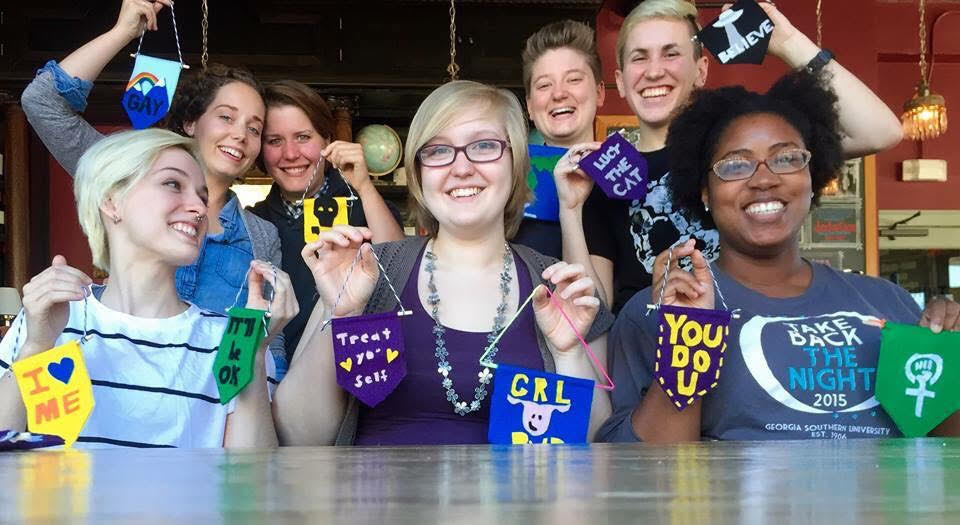
Indystraddlers doin’ their thing.
Whitney: So we’ve talked a little about creating safe spaces and how to remedy things that make people feel unsafe. Related, but different, question: How has your group addressed being inclusive and welcoming?
Brandalynn: Starting from a probably selfish place, personally when I started planning meet-ups, I had a few things specifically in mind – I wanted to consider food restrictions and age restrictions at any venues and to make sure that we had sober events. These were just the things that were on my radar because they were needs of my own not being met in the Indy community at large.
Claire: Super great thoughts. Age and sobriety can lead to huge cavernous holes in the queer community, so those are definitely great facets to be thinking about.
Whitney: Yes! Thinking about your needs and things that would make you have a good time at a meet-up is a super natural and good place to start! And then adding in more and you learn more about others in the group is so great. Sober events, all ages events, very intentional QPOC events… All of it helps create a welcoming and safer space for sure.
Brandalynn: Very quickly I realized I needed to do more to make sure that we were advertising ourselves correctly which is something I still struggle with. I answer a lot of “I identify as x, do you think I would fit in to your group” sort of questions esp with bi, pan, genderqueer and fluid folks, and I’m not sure how to frame the group to ease these fears from the get-go.
Claire: Yes, absolutely. I’m proud and pleased to say that Cincy Straddlers has had some new “branches” of our group appearing — a few people planning a QPOC group within it, someone new stepping up to lead a 30-years-and-over meet-up, some folks leading a Gender Feelz meet-up (open to anyone, but particularly being a place for trans and genderqueer and non-binary people) to chat about their feelings. Ideally, I’d just love to have even more subset groups of interest and experience so that everyone can find connections.
Brandalynn: Swoon. Claire, I would LOVE if Indy could get to that point!
Claire: Ha! You may! You will!
Whitney: Do it!
Claire: But yeah, good thoughts, Brandalynn. Cincy Straddlers, in our original discussions on safe space, quickly decided we didn’t want to be in the business of policing identity — “if you’re straight and cis you don’t belong here,” etc. — it doesn’t create good feelings for a lot of reasons and keeps questioning people or people who experience fluidity from feeling safe and like they belong. So our principle is: Everyone’s welcome as long as everyone respects the fact that this space is centered around queer women and trans people.
Brandalynn: Let me know how to cite that line if I borrow it!
Claire: Ha, no need to cite, you can use it wherever you like! That line tends to cover questions about who belongs. We have some straight friends on our page! But they’re all just chill people who hang with us sometimes, and it fits with the fact that this is a social group, not a support group. We also have always said that if anyone wants to create more-closed spaces, they can! For example, the QPOC group-within-our-group! But we just ask that they have a good conscious reason for making their subset or a particular meet-up exclusionary.
Cameron: I’m 100% updating our group description for that line, Claire.
Claire: Awww! I’m glad it resonates with y’all.
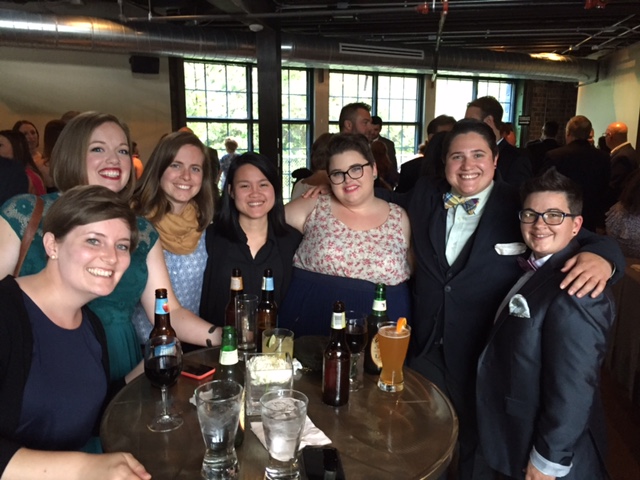
Columbus ‘straddlers at a WEDDING! A wedding! Together! Looking so cute!
Brandalynn: I’m so glad these conversations are happening. Thank y’all for doing all the work setting these up and putting on this series!
Whitney: I hope it encourages other folks to create similar spaces or join their local groups. It can really be a positive and great learning experience. I’ve learned so much!
Claire: Yeah, it’s so rad. And in particular I think we need to keep bringing voices into the conversation which can get squashed in queer communities. I’m especially thinking about bi and pan people at the moment!
Brandalynn: As a bi person dating a lady who gets read as a lesbian a lot, and who answers a lot of “will I belong” questions from bi ladies dating men who get read as straight a lot, I have a lot of feeling on that, Claire!
Cameron: So, question. This isn’t something that’s come up in our group yet and I hope it doesn’t, but it has with another community page. How do you deal with insensitive or alienating posts and the reactions to them?
Whitney: I’m a super direct type so I private message that person as soon as I see it and have a dialogue around it. Trying to understand the reasoning for the post and a conversation around why it’s harmful. Give them the option to post a comment apologizing or taking it down. We haven’t had a post like that in a while. It think most are really great about knowing what’s appropriate. But it doesn’t mean it can’t happen in the future.
Claire: I’d say this doesn’t happen too often in Cincy Straddlers, and so far, things tend to sort themselves out. Because a lot of our members have been in the group awhile or otherwise share our social-justice-y type values, people usually comment with good insight, and usually good, productive conversations get started. But, I know online conversations — particularly where strangers are talking to each other — can quickly begin to feel antagonistic. I really like the idea of Brandalynn’s agreement documents highlighting coming from a place of love and/or good faith. And usually that’s the thing, too, is that when someone does write a post that’s problematic, it’s just that: Problematic. Not meant to hurt or offend people, but often uninformed about the way people might react to tone or language or something. I do like Whitney’s idea of personal, direct message. That also appeals to me, particularly when I know the person. But I also am careful, because I know that for myself, doing that can sometimes feel like taking on a huge emotional burden. I try to find the right balance and not take responsibility for moderating the whole group myself.
Whitney: Yes. I don’t think most people set out to hurt others with their posts. But when it does, I think having a conversation around it can help. The individual and the group as a whole.
Claire: Luckily, ‘straddlers are literally the best people in the world I’ve ever experienced about this. People come into this group with so much enthusiasm, so much care for each other. It’s so remarkable to me that we don’t have way, way more problems. I’ve headed up other groups much smaller and much less complex in terms of differing identity and experience that had exponentially more drama and fewer skills to deal with it.
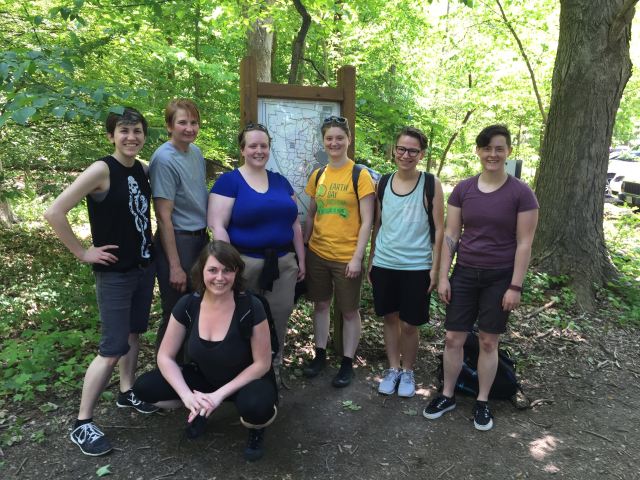
The Indystraddlers being adorable in nature.
Cameron: Right, right, totally. I have high hopes for the AS community, but I also totally understand when someone is offended and doesn’t have the emotional energy to spoonfeed a point delicately. I don’t actually expect to have much to worry about — especially considering the readership we’re dealing with. I’ve just seen things that turned out horribly in larger groups.
Brandalynn: I’ve got a couple people who really help me out IRL with meet-ups but I’m the main mod for the Facebook group. I’m glad you brought it up because I need to be thinking about these things.
Claire: It’s definitely good to be thinking about all of these things! And yeah, on the docs we drew up last year we had some points about how to “phone an ally” if you’re not feeling you have the energy to be the educator on behalf of yourself or your group. Okay, this last question is sort of a two-parter. But it’s just to get us thinking forward. What’s one thing, after this conversation, that each of you want to prioritize in terms of making your group safer and/or more welcoming? And what’s one way that the people in this conversation or the Autostraddle community as a whole can help you with that?
Whitney: Currently, I’m taking a step back from the Twin Cities Autostraddlers. I’m prioritizing my health and taking time for me so I feel safe. I’ve realized that sometimes in a leadership role, I’ve got to be selfish and make sure I’m good before jumping back in. It’s not easy because I’ve loved being a part of the group every day, but it’s necessary sometimes.
Claire: I love that. I think that’s super important for people planning meet-ups or organizing groups to hear! You have to make yourself feel safe first. Thanks for sharing, Whitney. You’ve poured a lot into your group and I’m so glad you’re taking time now to take care of you.
Brandalynn: Whitney, I think making sure you’re taking care of yourself so you can come at it from the best place is a radically important part of leadership and is very admirable.
Whitney: Thanks! It’s tough ’cause I wanna do ALL the things! But ultimately the best decision for me right now.
Brandalynn: I think this conversation has really pushed me to actually take action on these topics, to go from thinking to planning and doing. Developing specific and strategic ways to build community from a welcoming and inclusive place, rather than just rushing ahead and saying I’ll get to it eventually.
Cameron: Just to start, I for one am thinking more about more inclusive events — for example, it totally went over my head until now that most of ours have been at bars or around booze. Also finding someone extroverted who isn’t emotionally drained by face-to-face socialization to help out with the group. And of course updating our group description and setting some community guidelines.
Brandalynn: Cameron, I totally feel you about the extrovert thing. I super rely on one of Indy’s members, Candice, because she’s outgoing and awesome to back me up at meet-ups when I just don’t have it to do introductory activities or something. Thanks Candice, ILY.
Claire: Aww, these answers are awesome, you guys!
Whitney: So, so rad.
Cameron: Oh! And I want to check out the AS webpage’s comment policy again, because I think I remember it being a solid resource.
Claire: Awesome thought, Cameron! Personally, my answer to that last question: it’s also time for me to prioritize revising our documents to fit a bigger — 400 plus — group of humans! And you all can help me by continuing these same conversations and sharing your insights as we make these community guidelines a reality.
Brandalynn: I think sharing resources for handling difficult situations and creating safer spaces is a great place to start. I’ve gotten so many good ideas from our small conversation here today and we’re not the only ones doing what we’re doing. Additionally, I think members of groups or AS at large can and should speak up when they recognize something they need or somewhere they can step in and help in these groups? I can only approach a situation from where I stand, but I am more than willing to help someone else get what they need/want to see out of it. But I need their input.
Claire: Yes! Exactly. We all have our individual blind spots, so this has to be a community effort and a continually-evolving one — it’s one of those kinds of work that’s like, a lifelong journey and all that. The more input we can get, the better. As Brandalynn pointed out, we know this kind of work has been done before in many organizations. You have the knowledge; share it with us! I’m dreaming of getting a bunch of these safe space tips and documents compiled, talking through them with y’all and incorporating Autostraddle’s community values, until we have some solid resources for creating IRL safe(r) space that we can link to right on our own Meet-ups Resources & FAQs page!
Whitney: This is gonna be super rad. Thank you all for taking the time to chat with us. You all brought some wonderful insight and ideas!
Are you a meet-up host or the person in charge of your local meet-up group? Would you like to be? Then come join the ‘Straddler Nation ASS group! And readers out there sharing this conversation with us – do you have thoughts and tips for creating safe, or safer, spaces? Please comment and share them below! It’ll make Claire very happy.
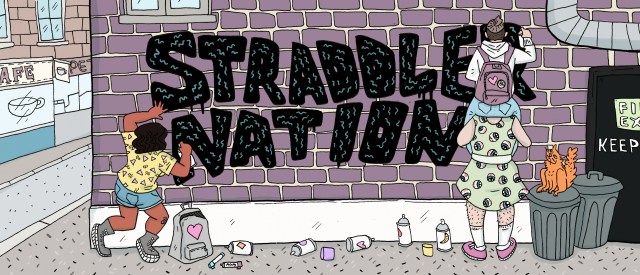

Heyyyy everyone looks so CUTE in the pictures.
(I have nothing more constructive to add at this moment).
Hey so I’m super new to all this and I’m a weird person so I don’t actually Facebook… can someone help me find out if there’s any group like this I could go to in Louisiana? I’ve been poking around this website for IRL meetups and all I see is NYC and Cali really… any Southerners at all out there please??
I live in a small town in north Louisiana but I’m willing to drive a while. I feel like there HAS to be something in New Orleans, Baton Rouge, Mobile, maybe even Gulf Shores or Jackson or something? Thanks!
I can’t think of any safe places except this site. No, wait! Just thought of another safe place! A pillow fort! The world of Skyrim! The toilet! Inside the comforts of an Ove Glove! The Tardis! The Loving Arms of you LOVED ONES!
And inside a Snuggie cocoon (づ。◕‿‿◕。)づ
How about a pillow fort in Skyrim? Or maybe Morrowind: https://www.youtube.com/watch?v=QWcMYhf0UYQ
Gensokyo (from Touhou) also seems like a relatively safe place!
Awww, I love seeing all these lovely Midwestern folx doing such great things for the AS community, since many of us only had the online spaces before. I love the ideas of living (and flexible) group agreements! So many people don’t realize how much effect structure like this has on the tone and effectiveness so kudos.
Awww B, thanks. I wasn’t always so outgoing, but I like to think of how can I make a new space more welcoming for those who are perhaps nervous, on the fence or going through a rough patch (since that is what I definitely was experiencing the first time I went to an Indystraddler meetup).
I love Autostraddle, I truly do.
Candice! (ง’̀-‘́)ง [I’m really glad you came and got involved and stayed with Indystraddle <3]
One thing I’ve noticed about some of the autostraddle Facebook groups is that they are not private, which means I have not been able to join the group for my hometown, and I have an event invite in my inbox that I can’t respond to because the cover photo is rainbow everything. They need to be private groups if you really want it to be a safe space-I cannot join a public queer Facebook group because I am not out to certain family members and my job. I look at the group periodically, but it’s hard to feel connected and I want to feel included without Facebook posting it to everyone’s newsfeed. And honestly, if I want to be a part of a community and see people posting updates about meet ups and stuff, I should be able to join the groups and not have to message the organizers explaining why I can’t rsvp on the event page because that’s embarrassing. Same with pictures-I’ve been in queer spaces where I’ve tried to politely step out of pictures because I don’t want to be tagged on the Internet, which makes for a weird moment. Like are you taking those pictures for your own memories, or to advertise the group? Specifically ask permission like “can I post this on the group page” or “can I use this on a public autostraddle post?” And then don’t ask questions why if a person says they don’t want to be in the picture. I just know I would feel a lot safer about going to an event if I knew my coworkers and homophobic family members didn’t see it showing up on the Internet.
I’ve been to a few autostraddle events in two different cities and everyone has been extremely welcoming and inclusive…it’s just that if you’re going to use Facebook as a way to organize these things, remember that literally every person’s mom/boss/crazy aunt/ex boyfriend is on Facebook and remember that Facebook is not necessarily a space that is welcoming and inclusive. I think there are a lot of people like myself who are fine being out and themselves in certain sutuations, but we need to be doing what we can to make sure everyone still feels in control of the situation.
i’ll definitely second this, though i know it’s a tricky balance because you don’t want the groups to be too hard for new people to find. i actually just made a secondary facebook account just so i could join an autostraddle group on there without worrying about people i’m not out to seeing it. the group was *so* close to being something i felt like i could join on my normal account, because it did things like refer to autostraddle as “AS” which was nicely ambiguous, but then it used the word “queer” in the description which anyone and everyone can see.
This is a really important topic to bring up with the idea of creating safe spaces in this community, thank you for pointing it out! Remembering to be explicit and ask about photo permissions when taking photos in queer spaces is something I know on a personal level I could be more intentional about.
Does the Facebook function of being able to hide groups help at all? Or having closed groups?
the thing about closed groups is that people can still see the fact that you joined the group in their news feed because closed groups’ membership isn’t secret. in theory a closed group is great, and the group i joined was a closed one, but since people can see the description of the group, it really matters that they’re not too explicit about what the group is for. things like the words “lesbian” and “queer” are kinda problematic if you’re in the closet, y’know?
I think the most important thing for me is that the groups be private so you have to ask to join, so anyone who stumbled upon the group randomly could not see who was a member, or if I commented or liked a status in the group, it wouldn’t show up on someone’s feed. I guess I’m not super sure how the privacy settings and group stuff works on an administrative end, but it would ease a lot of anxiety for someone who wanted to be part of a community but was afraid to take the first step because they were afraid of outing themselves.
I’m not trying to be overly critical-I just think it’s something to look into! There are a lot of us out there who want to hang out with ya’ll but aren’t quite loud and proud in all parts of life yet.
Gonna send this to the folx in Kansas City, MO who are creating a queer collective! And then read this and smile really big!
I was really excited to see Ohio featured so prominently! I’m in Cleveland for the summer and looking forward to getting to know some of y’all.
This was interesting, and will hopefully be helpful for next school year. One thing that I did not manage to do well this past year was “calling in” a white cis gay guy who made some racist and dangerously clueless remarks by email this fall.
Does anyone have advice on how to “call in” someone when the personal stakes are high? I’ve heard of “calling in” in theory, but I’m not so sure about practice. Does the place I’m speaking from, as a queer Mexican-American, even make it possible (forget easy) for me to “call in” instead of “call out” white people? Is there a way to do this without a) coming off as the angry POC, b) pandering to white guilt, c) doing draining educational work that I don’t have time for, d) getting apologetic, or e) etc. It’s a minefield, basically. The “phone an ally” thing seems to have been the least stressful tactic on me, and reasonably useful…but still not enough, and I don’t like that (in my situation) it apparently had to be “phone a white ally.”
Help? ¡Socorro!
Oh, and this was I guy I had to work with IRL on the board of a queer student group, until he quit. Also, I hope this isn’t too tangential a comment.
*a guy, not “I guy” – need to stop typing when tired, sorry